|
|
|
Sort Order |
|
|
|
Items / Page
|
|
|
|
|
|
|
| Srl | Item |
| 1 |
ID:
134341
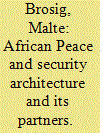

|
|
|
|
|
| Summary/Abstract |
This article presents survey data on the African Peace and Security Architecture (APSA). It focuses explicitly on two aspects: the internal constitution and achievements of the APSA; and coordination and cooperation with external actors, such as Regional Economic Communities, the United Nations and the European Union. The survey, conducted between October 2011 and December 2012, targeted 198 security experts in international organisations, think tanks, academia and non-governmental organisations. It reveals the APSA's current stage of development, achievements and challenges.
|
|
|
|
|
|
|
|
|
|
|
|
|
|
|
|
| 2 |
ID:
189656


|
|
|
|
|
| Summary/Abstract |
Extensive research has been conducted in the field of peacebuilding concerning the role of civil society in peace negotiations. However, although research has stressed the importance of coordination among civil society groups, we have limited knowledge concerning the impact civil society coordination can have on the content of a peace agreement. This article addresses this gap by examining how the extent of coordination among civil society groups during peace negotiations influences the reflectiveness of a peace agreement in regard to civil society viewpoints. We argue that a high extent of coordination, where civil society actors coordinate tasks and spearhead viewpoints together, can help facilitate peace agreements that are more reflective of civil society group views. Based on a comparative analysis of Guatemala and El Salvador, the findings show that whereas coordination between different civil society groups was quite extensive in both peace processes, civil society viewpoints were inscribed into the peace agreement to a larger extent in the Guatemalan case. We identify two factors that contribute in shaping how coordination influences the content of peace accords: symmetrical transfer of information, and openness from the negotiation parties to consider suggestions from civil society.
|
|
|
|
|
|
|
|
|
|
|
|
|
|
|
|
| 3 |
ID:
101377
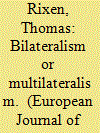

|
|
|
|
|
| Publication |
2010.
|
| Summary/Abstract |
Why do states cooperate bilaterally or multilaterally? This article addresses the issue using the example of international double tax avoidance. It is argued that double tax avoidance exhibits the strategic structure of a coordination game with a distributive conflict. The distribution of tax revenues depends on the asymmetry of investment flows between treaty partners. Since investment flows are defined dyadically, bilateral bargaining can best accommodate countries' concerns for the distribution of tax revenues and other economic benefits connected to the tax base. Moreover, because there are no serious externality problems with bilateral agreement, this solution is also viable. At the same time, there is a need for a multilateral organization to disseminate information and shared practices in the form of a model convention that provides a focal point for bilateral negotiations. This solution minimizes transaction costs. Since agreements are self-enforcing in coordination games there is no need for third-party enforcement. Instead, the Mutual Agreement Procedure (MAP) is a device to address problems of incomplete contracting.
|
|
|
|
|
|
|
|
|
|
|
|
|
|
|
|
| 4 |
ID:
167817
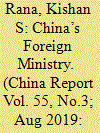

|
|
|
|
|
| Summary/Abstract |
President Xi Jinping has raised the bar in China’s engagement with the world: first, in launching in 2012 the ‘Belt and Road Initiative’ (BRI) as the idiom for intensive eco-political engagement with a wide swathe of states in Asia, Europe and Africa, plus Latin America; and second, in framing heightened global expectations for this self-avowed ‘major country’ that has moved out of the shadow of Deng Xiaoping’s 1989 hide our capacities and bide our time dictum. This places unprecedented demands on the foreign ministry, its diplomatic mission and personnel, and on all the other agencies that make up what we may call the foreign affairs network. The year 2018 has seen several new developments in the institutional structures and the work methods that connect with this enhanced priority to foreign policy implementation. This essay examines the challenges that China currently faces in pursuing its ambitious external objectives, in a fraught international environment and contestation among the world’s leading and emerging powers. Domestic challenges in coordinating actions are visible in BRI projects, which are a high national priority. The Chinese foreign ministry now receives better political support, but it remains unclear if this will suffice in meeting the major challenges they face, both abroad and at home—in working with domestic stakeholders.
|
|
|
|
|
|
|
|
|
|
|
|
|
|
|
|
| 5 |
ID:
140491
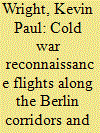

|
|
|
|
|
| Summary/Abstract |
During the Cold War, Soviet and East German military units, equipment and activities around Berlin were high priority targets for Western military intelligence agencies. This article examines the imagery gathering undertaken by British, French and US reconnaissance flights along the Berlin Air Corridors and inside the Berlin Control Zone. The quantity of information was effectively multiplied because of the close cooperation between the Western allies and coordination with Allied Military Liaison Mission ‘ground tours’. This cooperation generally went further than has been publicly acknowledged by individual governments. This paper contends that the collaboration provided the most comprehensive and regular collection of imagery on Soviet and East German military units for the duration of the Cold War. It contributed to a multi-dimensional picture of Soviet and German Democratic Republic capabilities and intentions. Soviet motives for generally not interfering with those missions on a regular basis are considered.
|
|
|
|
|
|
|
|
|
|
|
|
|
|
|
|
| 6 |
ID:
110560


|
|
|
|
|
| Publication |
2011.
|
| Summary/Abstract |
How can one analyze collective action in protests or revolutions when individuals are uncertain about the relative payoffs of the status quo and revolution? We model a "calculus of protest" of individuals who must either submit to the status quo or support revolt based only on personal information about their payoffs. In deciding whether to revolt, the citizen must infer both the benefit of successful revolution and the likely actions of other citizens. We characterize conditions under which payoff uncertainty overturns conventional wisdom: (a) when a citizen is too willing to revolt, he reduces the incentives of others to revolt; (b) less accurate information about the value of revolution can make revolt more likely; (c) public signals from other citizens can reduce the likelihood of revolt; (d) harsher punishment can increase the incidence of punishment; and (e) the incidence of protest can be positively correlated with that of repression.
|
|
|
|
|
|
|
|
|
|
|
|
|
|
|
|
| 7 |
ID:
155342
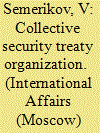

|
|
|
|
|
| Summary/Abstract |
THIS YEAR, the Collective Security Treaty Organization (CSTO) has marked two jubilees - the 25th anniversary of the Collective Security Treaty and the 15th anniversary of the organization itself. The CSTO is an effective mechanism that not only guarantees security to the organization's member countries but also plays a serious role in maintaining peace and stability in its region. The CSTO member states have developed close mutual relations that enable them to take effective joint action to defuse international tensions, prevent instability in individual regions, and stop existing conflicts from escalating.
|
|
|
|
|
|
|
|
|
|
|
|
|
|
|
|
| 8 |
ID:
176223
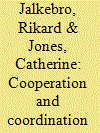

|
|
|
|
|
| Summary/Abstract |
East Asia (here consisting of China, Japan, North and South Korea, and the ten states of the ASEAN) is increasingly being considered as a region which is a potential crucible for conflict. Even the most optimistic authors recognise that there is the potential for security tensions to develop into more comprehensive kinetic actions. In the context of the growing trade tensions between China and the United States, which is drawing in other regional actors, the potential for economic interdependence to mitigate these tensions is reducing. Despite the context in this region we do, however, see evidence of cooperation and coordination emerging within the arena of (so-called) non-traditional security challenges. These papers explore different aspects of the cooperation that we see, and collectively they present the conditions under which there are positive cooperation outcomes in the areas of humanitarian assistance (HA) and disaster relief (DR) and/or peacekeeping operations (PKO). Collectively, they identify that mid-range theories have great explanatory power in exploring and researching this region.
|
|
|
|
|
|
|
|
|
|
|
|
|
|
|
|
| 9 |
ID:
167458
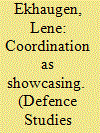

|
|
|
|
|
| Summary/Abstract |
In complex operations such as the interventions in Iraq and Afghanistan, where multiple government ministries are involved in putting together a state’s contributions, the use of national-level coordination bodies has become more widespread. Research has taken for granted that the rationale behind these bodies reflects their declared aim – enhanced coordination as a means to improve mission effectiveness. However, they appear to have had modest effect on coordination. That notwithstanding, they seem to remain popular. This prompts us to ask why such bodies are actually established. This article – based on in-depth interviews and archival records – critically explores the establishment of Norway’s ad hoc, inter-ministerial, political-level Afghanistan Forum. Distinguishing between a structural-instrumental, a cultural-institutional and an environmental perspective from organizational theory to structure the analysis, this article shows that the declared purpose of the forum, inter-ministerial coordination, proved less important than showcasing coordination efforts and keeping the coalition together. In addition, national traditions in handling coordination challenges in the central government apparatus and powerful international reforms helped bring the forum about. This has implications for research on the rationale and effectiveness of these bodies, and also for understanding their policy relevance.
|
|
|
|
|
|
|
|
|
|
|
|
|
|
|
|
| 10 |
ID:
072438
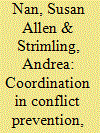

|
|
|
| 11 |
ID:
149939
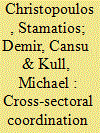

|
|
|
|
|
| Summary/Abstract |
Increasing the energy efficiency not only requires the improvement of current technologies, but also advancement of and more coherent institutional governance. This paper captures the major structural and organisational elements of institutional governance in place for promoting energy efficiency. Looking at Croatia – one of the most successful cases of energy efficiency programming of the past decade – the paper zooms in on governance coordination (metagovernance) between actors from different sectors and operating at multiple levels. By showcasing the positive implications of the programme, the authors contribute to the debate concerned with identifying better institutional frameworks to attain sustainable development. The programme showed effective governance through vertical and horizontal coordination among institutions and stakeholders resulting in simultaneous social and economic development and improved energy efficiency in public buildings. Through the case of Croatia, this study identifies how metagovernance has supported coordination among actors aiming to create sustainable development in general and how metagovernance functions in energy efficiency related projects, in particular. The paper also sheds light on communication frameworks of governance coordination and institutional constraints lying at the heart of the vagueness of sustainable development. It also discusses private sector involvement to achieve better institutional framework to attain sustainable development.
|
|
|
|
|
|
|
|
|
|
|
|
|
|
|
|
| 12 |
ID:
181960
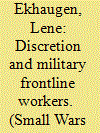

|
|
|
|
|
| Summary/Abstract |
This article explores how military ‘frontline workers’ use their discretion to interpret and then comply, breach or bypass policies that reach into the tactical level, and why. Based on extensive primary sources including in-depth interviews, end-of-tour reports and data from records, the case study explores the implementation of policies on civil-military relations by military commanders in the Norwegian-led Provincial Reconstruction Team (PRT) in Afghanistan in 2005–2012. This article finds that the commanders used their considerable discretion to implement policies that parted from national directives. In doing so, the Norwegian military strove to align their approach with close allies and NATO and became actual policy-makers. This article contributes to the debate on how western militaries behave at the tactical level by employing the concept of ‘discretion’.
|
|
|
|
|
|
|
|
|
|
|
|
|
|
|
|
| 13 |
ID:
125277
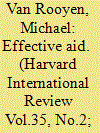

|
|
|
|
|
| Publication |
2013.
|
| Summary/Abstract |
Humanitarian assistance is aimed at providing rapid, life-saving support in settings of high population vulnerability, such as in times of war, disaster, or displacement. The provision of humanitarian assistance is complicated by severe access restrictions, large-scale emergency needs, displaced populations, and complex political and social settings. Both war and disasters create, and often amplify, existing economic disparities and contribute to an environment in which gender inequities, human vulnerabilities, and human rights abuses are likely to be exacerbated. The emergency response to large-scale humanitarian emergencies such as the 2010 earthquake in Haiti creates a sense of public urgency and political pressure to intervene. The last decade has seen significant advances in the standardization and coordination of relief and development activities, including improved mechanisms for coordination and accountability. While these efforts provided a solid basis for improved efficiency, they have faltered in recent large-scale crises. As the global relief and development community contemplates the next decades of humanitarian operations, a few essential questions should be raised: What are the most important barriers to providing effective aid? What future issues must be understood to optimize the efficiency of aid? What is the cost of inaction and what are the ramifications of not changing the system? This article will focus on some of the factors contributing to ineffective humanitarian aid and discuss the progress toward humanitarian reform, including the need for professionalism, coordination, and accountability.
|
|
|
|
|
|
|
|
|
|
|
|
|
|
|
|
| 14 |
ID:
175023
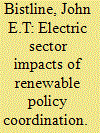

|
|
|
|
|
| Summary/Abstract |
Policies to encourage renewable electricity generation have grown at national and subnational levels. These measures are often characterized by geographical fragmentation, as jurisdictions typically select their own renewable targets without coordinating with neighboring regions. However, the literature on renewable policies has not examined the effects of cross-border interactions and coordination, especially in a multi-model comparison to examine robustness to structural and parametric uncertainties. This paper assesses the impacts of regional and international renewable policy coordination on economic, environmental, and planning outcomes in the North American power sector. Using a multi-model comparison with eight energy-economic models, the analysis demonstrates how prospective renewable mandate trade formulations impact power sector outcomes like capacity planning decisions, costs, emissions, trade, and infrastructure investments. Model results suggest that renewable policy coordination can lower costs by up to 20% for the stringencies examined here. Fragmentation lowers gas-fired generation, but coal and nuclear are also displaced, especially when regions comply without trade. Policy costs decrease for the U.S. with higher regional and international coordination, but magnitudes vary by model. Restricting coordination leads to higher capacity investments, and absent incentives to enhance efficiency, grids do not share resources to balance variability. Transmission investments and trade are highest with international policy coordination.
|
|
|
|
|
|
|
|
|
|
|
|
|
|
|
|
| 15 |
ID:
126219


|
|
|
|
|
| Publication |
2012.
|
| Summary/Abstract |
Effective communication and coordination are critical when investigating a possible drinking water contamination incident. A contamination warning system is designed to detect water contamination by initiating a coordinated, effective response to mitigate significant public health and economic consequences. This article describes historical communication barriers during water contamination incidents and discusses how these barriers were overcome through the public health surveillance component of the Cincinnati Drinking Water Contamination Warning System, referred to as the "Cincinnati Pilot." By enhancing partnerships in the public health surveillance component of the Cincinnati Pilot, information silos that existed in each organization were replaced with interagency information depots that facilitated effective decision making.
|
|
|
|
|
|
|
|
|
|
|
|
|
|
|
|
| 16 |
ID:
180894
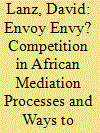

|
|
|
|
|
| Summary/Abstract |
This article seeks to make sense of the dynamics of competition in African mediation processes and to outline approaches for effective cooperation between mediators. To this end, it analyzes four cases of recent peace processes: Sudan (1994–2005), Kenya (2008), Madagascar (2009–2013) and South Sudan (2013–2015). The article identifies four driving forces of competition among mediators: clashing interests of states involved in mediation, overlapping mediation mandates, incompatible norms guiding conflict resolution, and mediators’ lack of performance. These factors risk undermining peace processes unless the involved mediators and guarantors take active steps to mitigate the negative effects of competition. This can be done through ‘hierarchical coordination,’ where a recognized authority takes the lead and allocates roles to other actors, or through ‘collaborative cooperation,’ where partners have unity of purpose and decide on a division of labor based on comparative strengths.
|
|
|
|
|
|
|
|
|
|
|
|
|
|
|
|
| 17 |
ID:
083815
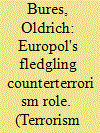

|
|
|
|
|
| Publication |
2008.
|
| Summary/Abstract |
This article offers an analysis of Europol's counterterrorism role. Based on official EU documents, internal reports, and secondary sources, it dissects the contemporary counterterrorism activities of both Europol and the informal arrangements outside of the EU structure that are frequently utilized by some EU Member States. Although Europol does not perform any indispensable counterterrorism functions at the moment due to its limited powers and lack of trust from national agencies, the author contends that Europol has the potential to make a substantial contribution to the fight against terrorism.
|
|
|
|
|
|
|
|
|
|
|
|
|
|
|
|
| 18 |
ID:
163391
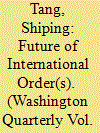

|
|
|
|
|
| Summary/Abstract |
When it comes to the future of the international order, we are now in a new Age of Anxiety. The international order will persist, but it will be less West-centric and fragmented. Although the rules will be more contested, that will not necessarily be politically violent or morally bad, but it will be more bottom-up–increasingly built upon regionalization and coordination.
|
|
|
|
|
|
|
|
|
|
|
|
|
|
|
|
| 19 |
ID:
181198


|
|
|
|
|
| Summary/Abstract |
Can governments elected under mixed-member majoritarian (MMM) electoral systems use geographically targeted spending to increase their chances of staying in office, and if so, how? Although twenty-eight countries use MMM electoral systems, scant research has addressed this question. The authors explain how MMM’s combination of electoral systems in two unlinked tiers creates a distinct strategic environment in which a large party and a small party can trade votes in one tier for votes in the other tier in a way that increases the number of seats won by both. They then explain how governing parties dependent on vote trading can use geographically targeted spending to cement it. These propositions are tested using original data from Japan (2003–2013) and Mexico (2012–2016). In both cases, municipalities in which the supporters of governing parties split their ballots as instructed were found to have received more money after elections. The findings have broad implications for research on MMM electoral systems, distributive politics, and the politics of Japan and Mexico.
|
|
|
|
|
|
|
|
|
|
|
|
|
|
|
|
| 20 |
ID:
149715
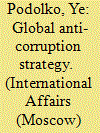

|
|
|
|
|
| Summary/Abstract |
CORRUPTION is a global threat. In any country, no matter what its political system and level of economic development are, corruption threatens stability and public well-being, deprives people of their rights and makes them defenseless, and inevitably and heavily undermines national security and sovereignty.
|
|
|
|
|
|
|
|
|
|
|
|
|
|
|
|
|
|
|
|
|